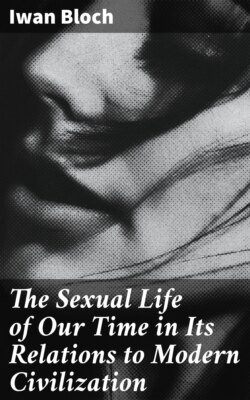Читать книгу The Sexual Life of Our Time in Its Relations to Modern Civilization - Iwan 1872-1922 Bloch - Страница 37
На сайте Литреса книга снята с продажи.
CONTENTS OF CHAPTER VIII
ОглавлениеTable of Contents
The individualization of love a product of recent times — Finck’s “romantic” love too narrow a conception — Rôle of the idealization of the senses — First beginnings of individual love — The Platonism of the Greeks and of the Renascence — Distinction between the plastic and the romantic — The love of the minnesinger — The connexion between the nature-sense and love — The secret elements in love — Love and gallantry — The slavery of love — The imaginative element in love — Predominance of tender feelings in the days of chivalry — The development of the conventional in the relationships of love — True and false gallantry — Love as presented by Shakespeare — Conventional life of pleasure in the days of Louis XIV. and XV. — The belief in woman (“Manon Lescaut”) — Rousseau’s “Julie” and Goethe’s “Werther” — The nature-sense and sentimentality in love — Difference between “The New Héloïse” and “Werther” — The first beginnings of Weltschmerz — Its physiological connexion with the vital feelings of puberty — The vital energy in the Weltschmerz of Goethe and Heine — The modern Weltschmerz — Nietzsche’s connexion with this matter — The love of the romantic period — A mirroring of the past — Dreams and emotions — Moonshine reverie — Conflict with conventional Philistine morality — Friedrich Schlegel’s “Lucinde” — Apotheosis of individual love — Individual love in relation to genius — Rôle of the emotional in romantic love — Love mysticism — The modern renascence of romanticism — The Dionysiac element in modern romantic love — Difference between romantic and classical love — Theodor Mundt on this subject — Goethe’s “Tasso” — Gretchen and Helena in “Faust” — Heine’s “Ardinghello,” a combination of romantic and classical love — The prototype of “young Germany” — Discussion of all modern love problems in young German literature — Gutzkow’s overwhelming importance — Among writers of the nineteenth century, Gutzkow’s knowledge of women is the most profound — His characteristic girls and women — Brings for the first time the problem of love upon the stage — The problem of personality in Gutzkow’s writings — The young German poetry of the flesh — Self-analysis and reflection in love — French precursors — Replacement of the medieval “sin” by self-reflection — Gutzkow’s “Wally” and “Seraphine” — The love of the emancipated woman — Kierkegaard’s and Grillparzer’s diaries — “Free love” and “free marriage” in modern literature — Influence of the Second Empire — The satanic and artistic elements in love — Pessimism. — Grisebach’s “New Tanhäuser” — The affirmation of life in this work — A glance at the present day.
